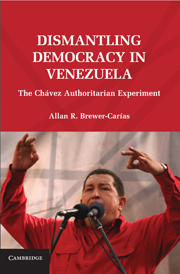Book contents
- Frontmatter
- Contents
- AUTHOR'S NOTE
- INTRODUCTION DEFRAUDING DEMOCRACY THROUGH NONCONSENSUAL CONSTITUENT ASSEMBLIES
- PART ONE THE POLITICAL ASSAULT ON STATE POWERS AND THE FRAMEWORK FOR AUTHORITARIANISM
- PART TWO INSTITUTIONAL DEVELOPMENT TOWARD CONSOLIDATING AUTHORITARIANISM
- Chapter 5 CONSTITUTIONAL FRAUD AND DEFRAUDING DEMOCRACY
- Chapter 6 THE REINFORCED CENTRALIZATION OF THE FEDERATION
- Chapter 7 CONCENTRATION OF POWERS AND AUTHORITARIAN GOVERNMENT
- Chapter 8 THE CATASTROPHIC DEPENDENCE AND POLITICAL SUBJECTION OF THE SUPREME TRIBUNAL OF JUSTICE
- Chapter 9 STATE APPROPRIATION, NATIONALIZATION, EXPROPRIATION, AND CONFISCATION OF PRIVATE ASSETS
- PART THREE CONSTITUTIONAL REFORMS DESIGNED TO CONSOLIDATE AUTHORITARIANISM
- INDEX
Chapter 9 - STATE APPROPRIATION, NATIONALIZATION, EXPROPRIATION, AND CONFISCATION OF PRIVATE ASSETS
Published online by Cambridge University Press: 05 June 2012
- Frontmatter
- Contents
- AUTHOR'S NOTE
- INTRODUCTION DEFRAUDING DEMOCRACY THROUGH NONCONSENSUAL CONSTITUENT ASSEMBLIES
- PART ONE THE POLITICAL ASSAULT ON STATE POWERS AND THE FRAMEWORK FOR AUTHORITARIANISM
- PART TWO INSTITUTIONAL DEVELOPMENT TOWARD CONSOLIDATING AUTHORITARIANISM
- Chapter 5 CONSTITUTIONAL FRAUD AND DEFRAUDING DEMOCRACY
- Chapter 6 THE REINFORCED CENTRALIZATION OF THE FEDERATION
- Chapter 7 CONCENTRATION OF POWERS AND AUTHORITARIAN GOVERNMENT
- Chapter 8 THE CATASTROPHIC DEPENDENCE AND POLITICAL SUBJECTION OF THE SUPREME TRIBUNAL OF JUSTICE
- Chapter 9 STATE APPROPRIATION, NATIONALIZATION, EXPROPRIATION, AND CONFISCATION OF PRIVATE ASSETS
- PART THREE CONSTITUTIONAL REFORMS DESIGNED TO CONSOLIDATE AUTHORITARIANISM
- INDEX
Summary
A general trend of the economic policy of the authoritarian government that has taken shape in Venezuela, following the framework established in the 1999 Constitution, has been the progressive appropriation by the state of private industries and services; a public policy that has been fueled during the past decade because of the state's uncontrolled expenditure of outstanding fiscal revenues derived from increased oil prices in the nationalized oil industry.
This process of state appropriation of the economy has occurred through the consensual acquisition of industries and services by means of private law contracts and agreements, as was the case with the main electricity (Electricidad de Caracas C.A.) and telephone (C.A. Teléfonos de Venezuela) companies. It also has occurred through public law instruments allowed for in the Constitution, like the nationalization of economic sectors, which always implies expropriation of private assets. But, in many cases, the forced appropriation of private assets occurred through unconstitutional confiscations.
THE COMPULSORY ACQUISITION OF PRIVATE ASSETS
In the Venezuelan legal system, the term nationalization refers to the public law institution through which the state, by means of a statute, reserves for itself an economic sector or activity, followed by the acquisition, normally through expropriation, of the private assets used in that sector or activity. The institution of nationalization was established in the 1961 Constitution (Article 97) and was first applied in the 1970s, through processes in which always was combined a legislative decision to reserve to the state the economic sector or activity and the administrative process of expropriation of the needed private assets, in order to make the reservation effective.”
- Type
- Chapter
- Information
- Dismantling Democracy in VenezuelaThe Chávez Authoritarian Experiment, pp. 245 - 262Publisher: Cambridge University PressPrint publication year: 2010



